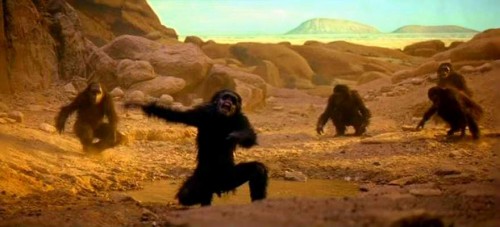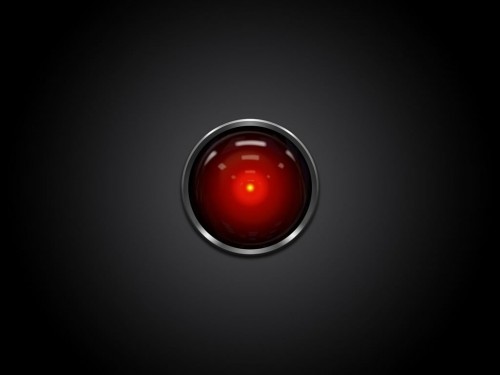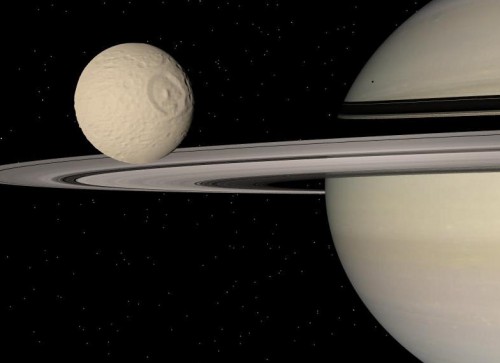Playboy: Much of the controversy surrounding 2001 deals with the meaning of the metaphysical symbols that abound in the film—the polished black monoliths, the orbital conjunction of Earth, Moon and Sun at each stage of the monoliths’ intervention in human destiny, the stunning final kaleidoscopic maelstrom of time and space that engulfs the surviving astronaut and sets the stage for his rebirth as a “star child” drifting toward Earth in a translucent placenta. One critic even called 2001 “the first Nietzschean film,” contending that its essential theme is Nietzsche’s concept of man’s evolution from ape to human to superman. What is the metaphysical message of 2001?
Kubrick: It’s not a message that I ever intend to convey in words. 2001 is a nonverbal experience; out of two hours and nineteen minutes of film, there are only a little less than forty minutes of dialog. I tried to create a visual experience, one that bypasses verbalized pigeonholing and directly penetrates the subconscious with an emotional and philosophic content. To convolute McLuhan, in 2001 the message is the medium. I intended the film to be an intensely subjective experience that reaches the viewer at an inner level of consciousness, just as music does; to “explain” a Beethoven symphony would be to emasculate it by creating an artificial barrier between conception and appreciation. You’re free to speculate as you wish about the philosophical and allegorical meaning of the film—and such speculation is indication that it has succeeded in gripping the audience at a very deep level—but I don’t want to spell out a verbal road map for 2001 that every viewer will feel obligated to pursue or fear he’s missed the point. I think that if 2001 succeeds at all, it is in reaching a wide spectrum of people who would not often give a thought to man’s destiny, his role in the cosmos and his relationshop to higher forms of life. But even in the case of someone who is highly intelligent, certain ideas found in 2001 would, if presented as abstractions, fall rather lifelessly and be automatically assigned to pat intellectual categories; experienced a moving visual and emotional context, however, they can resonate within the deepest fibers of one’s being.

Playboy: Without laying out a philosophical road map for the viewer, can you tell us your own interpretation of the meaning of the film?
Kubrick: No, for the reasons I’ve already given. How much would we appreciate La Gioconda today if Leonardo had written at the bottom of the canvas: “This lady is smiling slightly because she has rotted teeth”—or “because she’s hiding a secret from her lover”? It would shut off the viewer’s appreciation and shackle him to a “reality” other than his own. I don’t want that to happen to 2001.
Playboy: Arthur Clarke has said of the film, “If anyone understands it on the first viewing, we’ve failed in our intention.” Why should the viewer have to see a film twice to get its message?
Kubrick: I don’t agree with that statement of Arthur’s, and I believe he said it facetiously. The very nature of the visual experience in 2001 is to give the viewer an instantaneous, visceral reaction that does not—and should not—require further amplification. Just speaking generally, however, I would say that there are elements in any good film that would increase the viewer’s interest and appreciation on a second viewing; the momentum of a movie often prevents every stimulating detail or nuance from having a full impact the first time it’s seen. The whole idea that a movie should only be seen once is an extension of our traditional conception of the film as an ephemeral entertainment rather than as a visual work of art. We don’t believe that we should hear a great piece of music only once, or see a great painting once, or even read a great book just once. But the film has until recent years been exempted from the category of art—a situation I’m glad is finally changing.

Playboy: Some prominent critics—including Renata Adler of The New York Times, John Simon of The New Leader, Judith Crist of New York magazine and Andrew Sarris of the Village Voice—apparently felt that 2001 should be among those films still exempted from the category of art; all four castigated it as dull, pretentious, and overlong. How do you account for their hostility?
Kubrick: The four critics you mention all work for New York publications. The reviews across America and around the world have been ninety-five percent enthusiastic. Some were more perceptive than others, of course, but even those who praised the film on relatively superficial grounds were able to get something of its message. New York was the only really hostile city. Perhaps there is a certain element of the lumpen literati that is so dogmatically atheist and materialist and Earth-bound that is finds the grandeur of space and the myriad mysteries of cosmic intelligence anathema. But film critics, fortunately, rarely have any effect on the general public; houses everywhere are packed and the film is well on its way to becoming the greatest moneymaker in MGM’s history. Perhaps this sounds like a crass way to evaluate one’s work, but I think that, especially with a film that is so obviously different, record audience attendance means people are saying the right things to one another after they see it—and isn’t this really what it’s all about?

Playboy: Speaking of what it’s all about—if you’ll allow us to return to the philosophical interpretation of 2001—would you agree with those critics who call it a profoundly religious film?
Kubrick: I will say that the God concept is at the heart of 2001—but not any traditional, anthropomorphic image of God. I don’t believe in any of Earth’s monotheistic religions, but I do believe that one can construct an intriguing scientific definition of God, once you accept the fact that there are approximately 100 billion stars in our galaxy alone, that its star is a life-giving sun and that there are approximately 100 billion galaxies in just the visible universe. Given a planet in stable orbit, not too hot and not too cold, and given a few billion years of chance chemical reactions created by the interaction of sun’s energy on the planet’s chemicals, it’s fairly certain that life in one form or another will eventually emerge. It’s reasonable to assume that there must be, in fact, countless billions of such planets where biological life has arisen, and the odds of some proportion of such life developing intelligence are high. Now, the sun is by no means an old star, and its planets are mere children in cosmic age, so it seems likely that there are billions of planets in the universe not only where intelligent life is on a lower scale than man but other billions where it is approximately equal and others still where it is hundreds of thousands of years in advance of us. When you think of the giant technological strides that man has made in a few millennia—less than a microsecond in the cosmology of the universe—can you imagine the evolutionary development that much older life forms have taken? They may have progressed from biological species, which are fragile shells for the mind at best, into immortal machine entities—and then, over innumerable eons, they could emerge from the chrysalis of matter transformed into beings of pure energy and spirit. Their potentialities would be limitless and their intelligence ungraspable by humans.

Playboy: Even assuming the cosmic evolutionary path you suggest, what has this to do with the nature of God?
Kubrick: Everything—because these beings would be gods to the billions of less advanced races in the universe, just as man would appear a god to an ant that somehow comprehended man’s existence. They would possess the twin attributes of all deities—omniscience and omnipotence. These entities might be in telepathic communication throughout the cosmos and thus be aware of everything that occurs, tapping every intelligent mind as effortlessly as we switch on the radio; they might not be limited by the speed of light and their presence could penetrate to the farthest corners of the universe; they might possess complete mastery over matter and energy; and in their final evolutionary stage, they might develop into an integrated collective immortal consciousness. They would be incomprehensible to us except as gods; and if the tendrils of their consciousness ever brushed men’s minds, it is only the hand of God we could grasp as an explanation.
Playboy: If such creatures do exist, why should they be interested in man?
Kubrick: They may not be. But why should man be interested in microbes? The motives of such beings would be as alien to us as their intelligence.
Playboy: In 2001, such incorporeal creatures seem to manipulate our destinies and control our evolution, though whether for good or evil—or both, or neither—remains unclear. Do you really believe it’s possible that man is a cosmic plaything of such entities?
Kubrick: I don’t really believe anything about them; how can I? Mere speculation on the possibility of their existence is sufficiently overwhelming, without attempting to decipher the motives. The important point is that all the standard attributes assigned to God in our history could equally well be the characteristics of biological entities who billions of years ago were at a stage of development similar to man’s own and evolved into something as remote from man as man is remote from the primordial ooze from which he first emerged.

Playboy: In this cosmic phylogeny you’ve described, isn’t it possible that there might be forms of intelligent life on an even higher scale than these entities of pure energy—perhaps as far removed from them as they are from us?
Kubrick: Of course there could be; in an infinite, eternal universe, the point is that anything is possible, and it’s unlikely that we can even begin to scratch the surface of the full range of possibilities. But at a time when man is preparing to set foot on the Moon, I think it’s necessary to open up our Earth bound minds to such speculation. No one knows what’s waiting for us in our universe. I think it was a prominent astronomer who wrote recently, “Sometimes I think we are alone, and sometimes I think we’re not. In either case, the idea is quite staggering.”
Playboy: You said that there must be billions of planets sustaining life that is considerably more advanced than man but has not yet evolved into non- or suprabiological forms. What do you believe would be the effect on humanity if the Earth were contacted by a race of such ungodlike but technologically superior beings?
Kubrick: There’s a considerable difference of opinion on this subject among scientists and philosophers. Some contend that encountering a highly advanced civilization—even one whose technology is essentially comprehensible to us—would produce a traumatic cultural shock effect on man by divesting him of his smug ethnocentrism and shattering the delusion that he is the center of the universe. Carl Jung summed up this position when he wrote of contact with advanced extraterrestrial life that “reins would be torn from our hands and we would, as a tearful old medicine man once said to me, find ourselves ‘without dreams’ … we would find our intellectual and spiritual aspirations so outmoded as to leave us completely paralyzed.” I personally don’t accept this position, but it’s one that’s widely held and can’t be summarily dismissed.
In 1960, for example, the Committee for Long Range Studies of the Brookings Institution prepared a report for the National Aeronautics and Space Administration warning that even indirect contact—i.e., alien artifacts that might possibly be discovered through our space activities on the Moon, Mars, or Venus or via radio contact with an interstellar civilization—could cause severe psychological dislocations. The study cautioned that “Anthropological files contain many examples of societies, sure of their place in the universe, which have disintegrated when they have had to associate with previously unfamiliar societies espousing different ideas and different life ways; others that survived such an experience usually did so by paying the price of changes in values and attitudes and behaviour.” It concluded that since the consequences of any such discovery are “presently unpredictable,” it was advisable that the government initiate continuing studies on the psychological and intellectual impact of confrontation with extra-terrestrial life. What action was taken on this report I don’t know, but I assume that such studies are now under way. However, while not discounting the possible adverse emotional impact on some people, I would personally tend to view such contact with a tremendous amount of excitement and enthusiasm. Rather than shattering our society, I think it could immeasurably enrich it.

Another positive point is that it’s a virtual certainty that all intelligent life at one stage in its technological development must have discovered nuclear energy. This is obviously the watershed of any civilization; does it find a way to use nuclear power without destruction and harness it for peaceful purposes, or does it annihilate itself? I would guess that any civilization that has existed for a few thousand years after its discovery of atomic energy has devised a means of accommodating itself to the bomb, and this could prove tremendously reassuring to us—as well as give us specific guidelines for our own survival. In any case, as far as cultural shock is concerned, my impression is that the attention span of most people is quite brief; after a week or two of great excitement and over-saturation in the newspapers and on television, the public’s interest would drop off and the United Nations, or whatever world body we had then, would settle down to discussions with the aliens.
Playboy: You’re assuming that extraterrestrials would be benevolent. Why?
Kubrick: Why should a vastly superior race bother to harm or destroy us? If an intelligent ant suddenly traced a message in the sand at my feet reading, “I am sentient; let’s talk things over,” I doubt very much that I would rush to grind him under my heel. Even if they weren’t superintelligent, though, but merely more advanced than mankind, I would tend to lean more toward the benevolence, or at least indifference, theory. Since it’s most unlikely that we would be visited from within our own solar system, any society capable of traversing light-years of space would have to have an extremely high degree of control over matter and energy. Therefore, what possible motivation for hostility would they have? To steal our gold or oil or coal? It’s hard to think of any nasty intention that would justify the long and arduous journey from another star.

Playboy: You’ll admit, though, that extraterrestrials are commonly portrayed in comic strips and cheap science-fiction films as bug-eyed monsters scuttling hungrily after curvaceous Earth maidens.
Kubrick: This probably dates back to the pulp science-fiction magazines of the twenties and thirties and perhaps even to the Orson Welles Martian-invasion broadcast in 1938 and the resultant mass hysteria, which is always advanced in support of the hypothesis that contact would cause severe cultural shock. In a sense, the lines with which Welles opened that broadcast set the tone for public consideration of extraterrestrial life for years to come. I’ve memorized them: “Across an immense ethereal gulf, minds that are to our minds as ours are to the beasts in the jungle—intellects vast, cool, and unsympathetic—regarded this Earth with envious eyes and slowly and surely drew their plans against us. …” Anything we can imagine about such other life forms is possible, of course. You could have psychotic civilizations, or decadent civilizations, that have elevated pain to an aesthetic and might covet humans as gladiators or torture objects, or civilizations that might want us for zoos, or scientific experimentations, or slaves or even for food. While I am appreciably more optimistic, we just can’t be sure what their motivations will be.
I’m interested in the argument of Professor Freeman Dyson of Princeton’s Institute for Advanced Study, who contends that it would be a mistake to think that all potential space visitors would be altruistic, or to believe that they would have any ethical or moral concepts comparable to mankind’s. Dyson writes, if I remember him correctly, that “Intelligence may indeed be a benign influence creating isolated groups of philosopher kings far apart in the heavens,” but it’s just as likely that “Intelligence may be a cancer of purposeless technological exploitation, sweeping across a galaxy as irresistibly as it has swept across our own planet.” Dyson concludes that it’s “just as unscientific to impute to remote intelligence wisdom and serenity as it is to impute to them irrational and murderous impulses. We must be prepared for either possibility and conduct our searches accordingly.”
This is why some scientists caution, now that we’re attempting to intercept radio signals from other solar systems, that if we do receive a message we should wait awhile before answering it. But we’ve been transmitting radio and television signals for so many years that any advanced civilization could have received the emissions long ago. So in the final analysis, we don’t really have much choice in this matter; they’re either going to contact us or they’re not, and if they do we’ll have nothing to say about their benevolence or their malevolence.
Even if they prove to be malevolent, their arrival would have at least one useful by-product in that the nations of the Earth would stop squabbling among themselves and forge a common front to defend the planet. I think it was André Maurois who suggested many years ago that the best way to realize world peace would be to stage a false threat from outer space; it’s not a bad idea. But I certainly don’t believe we should view contact with extraterrestrial life with foreboding, or hesitate to visit other planets for fear of what we may find there. If others don’t contact us, we must contact them; it’s our destiny.

Playboy: You indicated earlier that intelligent life is extremely unlikely elsewhere within our solar system. Why?
Kubrick: From what we know of the other planets in this system, it appears improbable that intelligence exists, because of surface temperatures and atmospheres that are inhospitable to higher life forms. Improbable, but not impossible. I will admit that there are certain tantalizing clues pointing in the other direction. For example, while the consensus of scientific opinion dismisses the possibility of intelligent life on Mars—as opposed to plant or low orders of organic life—there are some eminently respectable dissenters. Dr. Frank B. Salisbury, professor of plant physiology at Utah State University, has contended in a study in Science magazine that if vegetation exists on a planet, then it is logical that there will be higher orders of life to feed on it. “From there,” he writes, “it is but one more step—granted, a big one—to intelligent beings.”
Salisbury also points out that a number of astronomers have observed strange flashes of light, possibly explosions of great magnitude, on Mars’s surface, some of which emit clouds; and he suggests that these could actually be nuclear explosions. Another interesting facet of Mars is the peculiar orbits of its twin satellites, Phobos and Deimos, first discovered in 1877—the same year, incidentally, that Schiaparelli discovered his famous but still elusive Martian “canals.” One eminent astronomer, Dr. Josef Shklovsky, chairman of the department of radio astronomy at the Shternberg Astronomical Institute in Moscow, has propounded the theory that both moons are artificial space satellites launched by the Martians thousands of years ago in an effort to escape the dying surface of their planet. He bases this theory on the unique orbits of the two moons, which, unlike the thirty-one other satellites in our solar system, orbit faster than the revolution of their host planet. The orbit of Phobos is also deteriorating in an inexplicable manner and dragging the satellite progressively closer to Mars’s surface. Both of these circumstances, Shlovsky contends, make sense only if the two moons are hollow.

Shlovsky believes that the satellites are the last remnants of an extinct ancient Martian civilization; but Professor Salisbury goes a step further and suggests that they were launched within the past hundred years. Noting that the moons were discovered by a relatively small power telescope in 1877 and not detected by a much more powerful telescope observing Mars in 1862—when the planet was appreciably nearer Earth—he asks: “Should we attribute the failure of 1862 to imperfections in the existing telescope, or may we imagine that the satellites were launched into orbit between 1862 and 1877?” There are no answers here, of course, only questions, but it is fascinating speculation. On balance, however, I would have to say that the weight of available evidence dictates against intelligent life on Mars.
Playboy: How about the possibilities, if not the probabilities, of intelligent life on the other planets?
Kubrick: Most scientists and astronomers rule out like of the outer planets since their surface temperatures are thousands of degrees either above or below zero and their atmospheres would be poisonous. I suppose it’s possible that life could evolve on such planets with, say, a liquid ammonia or methane base, but it doesn’t appear too likely. As far as Venus goes, the Mariner probe indicates that the surface temperature of the planet is approximately eight hundred degrees Fahrenheit, which would deny the chemical basis for molecular development of life. And there could be no indigenous intelligent life on the Moon, because of the total lack of atmosphere—no life as we know it, in any case; though I suppose that intelligent rocks or crystals, or statues, with a silicone life base are not really impossible, or even conscious gaseous matter or swarms of sentient electric particles. You’d get no technology from such creatures, but if their intelligence could control matters, why would they need it? There could be nothing about them, however, even remotely humanoid—a form that would appear to be an eminently practicable universal life prototype.

Playboy: What do you think we’ll find on the Moon?
Kubrick: I think the most exciting prospect about the Moon is that if alien races have ever visited Earth in the remote past and left artifacts for man to discover in the future, they probably chose the arid, airless lunar vacuum, where no deterioration would take place and an object could exist for millennia. It would be inevitable that as man evolved technologically, he would reach his nearest satellite and the aliens would then expect him to find their calling card—perhaps a message of greeting, a cache of knowledge or simply a cosmic burglar alarm signaling that another race had mastered space flight. This, of course, was the central situation of 2001.
But an equally fascinating question is whether there could be another race of intelligent life on Earth. Dr. John Lilly, whose research into dolphins has been funded by the National Aeronautics and Space Administration, has amassed considerable evidence pointing to the possibility that the bottle-nosed dolphin may be as intelligent as or more intelligent than man. He bases this not only on its brain size—which is larger than man’s and with a more complex cortex—but on the fact that dolphins have developed an extensive language. Lilly is currently attempting, with some initial success, to decipher this language and establish communication with the dolphins. NASA’s interest in this is obvious, because learning to communicate with dolphins would be a highly instructive precedent for learning to communicate with alien races on other planets. Of course, if the dolphins are really intelligent, theirs is obviously a nontechnological culture, since without an opposable thumb, they could never create artifacts. Their intelligence might also be on a totally different order with man’s, which could make communication additionally difficult. Dr. Lilly has written that, “It is probable that their intelligence is comparable to ours, though in a very strange fashion … they may have a new class of large brain so dissimilar to ours that we cannot within our lifetime possibly understand its mental processes.” Their culture may be totally devoted to creating works of poetry or devising abstract mathematical concepts, and they could conceivably share a telepathic communication to supplement their high-frequency underwater language.

What is particularly interesting is that dolphins appear to have developed a concept of altruism; the stories of shipwrecked sailors rescued by dolphins and carried to shore, or protected by them against sharks, are by no means all old wives’ tales. But I’m rather disturbed by some recent developments that indicate not only how we may treat dolphins but how we may treat intelligent races on other planets. The Navy, impressed by the dolphin’s apparent intelligence, is reported to have been engaging in underwater-demolition experiments in which a live torpedo is strapped to a dolphin and detonated by radio whenever it nears a prototype enemy submarine. These experiments have been officially denied; but if they’re true, I’m afraid we may learn more about man through dolphins than the other way around. The Russians, paradoxically, seem to be one step ahead of us in this area; they recently banned all catching of dolphins in Russian waters on the grounds that “Comrade Dolphin” is a fellow sentient being and killing him would be morally equivalent to murder.
Playboy: Although flying saucers are frequently an object of public derision, there has been a good deal of serious discussion in the scientific community about the possibility that UFOs could be alien spacecraft. What’s your opinion?

Kubrick: The most significant analysis of UFOs I’ve seen recently was written by L. M. Chassin, a French Air Force general who has been a high ranking NATO officer. He argues that by any legal rules of evidence, there is now sufficient sighting data amassed from reputable sources—astronomers, pilots, radar operators and the like—to initiate a serious and thorough worldwide investigation of UFO phenomena. Actually, if you could examine even a fraction of the extant testimony you will find that people have been sent to the gas chamber on far less substantial evidence. Of course, it’s possible that all the governments in the world really do take UFOs seriously and perhaps are already engaging in secret study projects to determine their origin, nature and intentions. If so, they may not be disclosing their findings for fear that the public might be alarmed—the danger of cultural shock deriving from confrontation with the unknown which we discussed earlier, and which is an element of 2001, when news of the monolith’s discovery on the Moon is suppressed. But I think even the two percent of sightings that the Air Force’s Project Blue Book admits is unexplainable by conventional means should dictate a serious, searching probe. From all indications, the current government-authorized investigation at the University of Colorado is neither serious nor searching.
One hopeful sign that this subject may at last be accorded the serious discussion it deserves, however, is the belated but exemplary conversion of Dr. J. Allen Hynek, since 1948 the Air Force’s consultant on UFOs and currently chairman of the astronomy department at Northwestern University. Hynek, who in his official capacity pooh-poohed UFO sightings, now believes that UFOs deserve top-priority attention—as we wrote in Playboy—and even concedes that the existing evidence may indicate a possible connection with extraterrestrial life. He predicts: “I will be surprised if an intensive study yields nothing. To the contrary, I think that mankind may be in for the greatest adventure since dawning human intelligence turned outward to contemplate the universe.” I agree with him.

Playboy: If flying saucers are real, who or what do you think they might be?
Kubrick: I don’t know. The evidence proves they’re up there, but it gives us very little clue as to what they are. Some science-fiction writers theorize half-seriously that they could be time shuttles flicking back and forth between eons to a future age when man has mastered temporal travel; and I understand that biologist Ivan Sanderson has even advanced a theory that they may be some kind of living space animal inhabiting the upper stratosphere—though I can’t give much credence to that suggestion. It’s also possible that they are perfectly natural phenomena, perhaps chain lightning, as one American science writer has suggested; although this, again, does not explain some of the photographs taken by reputable sources, such as the Argentine navy, which clearly show spherical metallic objects hovering in the sky. As you’ve probably deduced, I’m really fascinated by UFOs and I only regret than this field of investigation has to a considerable extent been pre-empted by a crackpot fringe that claims to have soared to Mars on flying saucers piloted by three-foot—tall green humanoids with pointy heads. That kind of kook approach makes it very easy to dismiss the whole phenomenon which we do at our risk.
I think another problem here—and one of the reasons that, despite the overwhelming evidence, there has been remarkably little public interest—is that most people don’t really want to think about extraterrestrial beings patrolling our skies and perhaps observing us like bugs on a slide. The thought is too disturbing; it upsets our tidy, soothing, sanitized suburban Weltanschauung; the cosmos is more than light-years away from Scarsdale. This could be a survival mechanism, but it could also blind us to what may be the most dramatic and important moment in man’s history—contact with another civilization.

Playboy: Among the reasons adduced by those who doubt the interstellar origin of UFOs in Einstein’s special theory of relativity, which states that the speed of light is absolute and nothing can exceed it. A journey from even the nearest star to Earth would consequently take thousands of years. They claim this virtually rules out interstellar travel—at least for sentient beings with life spans as short as the longest known to man. Do you find this argument valid?
Kubrick: I find it difficult to believe that we have penetrated to the ultimate depths of knowledge about the physical laws of the universe. It seems rather presumptuous to believe that in the space of a few hundred years, we’e figured out most of what there is to know. So I don’t think it’s right to declaim with unshakable certitude that light is the absolute speed limit of the universe. I’m suspicious of dogmatic scientific rules; they tend to have a rather short life span. The most eminent European scientists of the early nineteenth century scoffed at meteorites, on the grounds that “stones can’t fall from the sky”; and just a year before Sputnik, one of the world’s leading astrophysicists stated flatly that “space flight is bunk.” Actually, there are already some extremely interesting theoretical studies underway—one by Dr. Gerald Feinberg at Columbia University—which indicate that short cuts could be found that would enable some things under some conditions to exceed the speed of light.
In addition, there’s always the possibility that the speed-of-light limitation, even if it’s rigid, could be circumvented via a spacetime warp, as Arthur Clarke has proposed. But let’s take another, slightly more conservative, means of evading the speed of light’s restrictions: If radio contact is developed between ourselves and another civilization, within two hundred years we will have reached a stage in genetic engineering where the other race could transmit its genetic code to us by radio and we could then re-create their DNA pattern and artificially duplicate one of their species in our laboratories—and vice versa. This sounds fantastic only to those who haven’t followed the tremendous breakthroughs in genetic engineering.

But actual interstellar travel wouldn’t be impossible even if light speed can’t be achieved. Whenever we dismiss space flight beyond our solar system on the grounds that it would take thousands of years, we are thinking of things with life spans similar to ours. Fruit flies, I understand, live out their entire existence—birth, reproduction, and death—within twenty-four hours; well, man may be to other creatures in the universe as the fruit fly is to man. There may be countless races in the universe with life spans of hundreds of thousands or even millions of years, to whom a 10,000-year journey to Earth would be about as intimidating as an afternoon outing in the park. But even in terms of our own time scale, within a few years it should be possible to freeze astronauts or induce a hibernatory suspension of life functions for the duration of an interstellar journey. They could spend 300 or 1000 years in space and be awakened automatically, feeling no different than if they had had a hearty eight hours’ sleep.
The speed-of-light theory, too, could work in favour of long journeys; the peculiar “time dilation” of Einstein’s relativity theory means that as an object accelerates toward the speed of light, time slows down. Everything would appear normal to those on board; but if they had been away from Earth for, say, fifty-six years, upon their return they would be merely twenty years older than when they departed. So, taking all these factors into consideration, I’m not unduly impressed by the claims of some scientists that the speed-of-light limitation renders interstellar travel impossible.


You must be logged in to post a comment Login